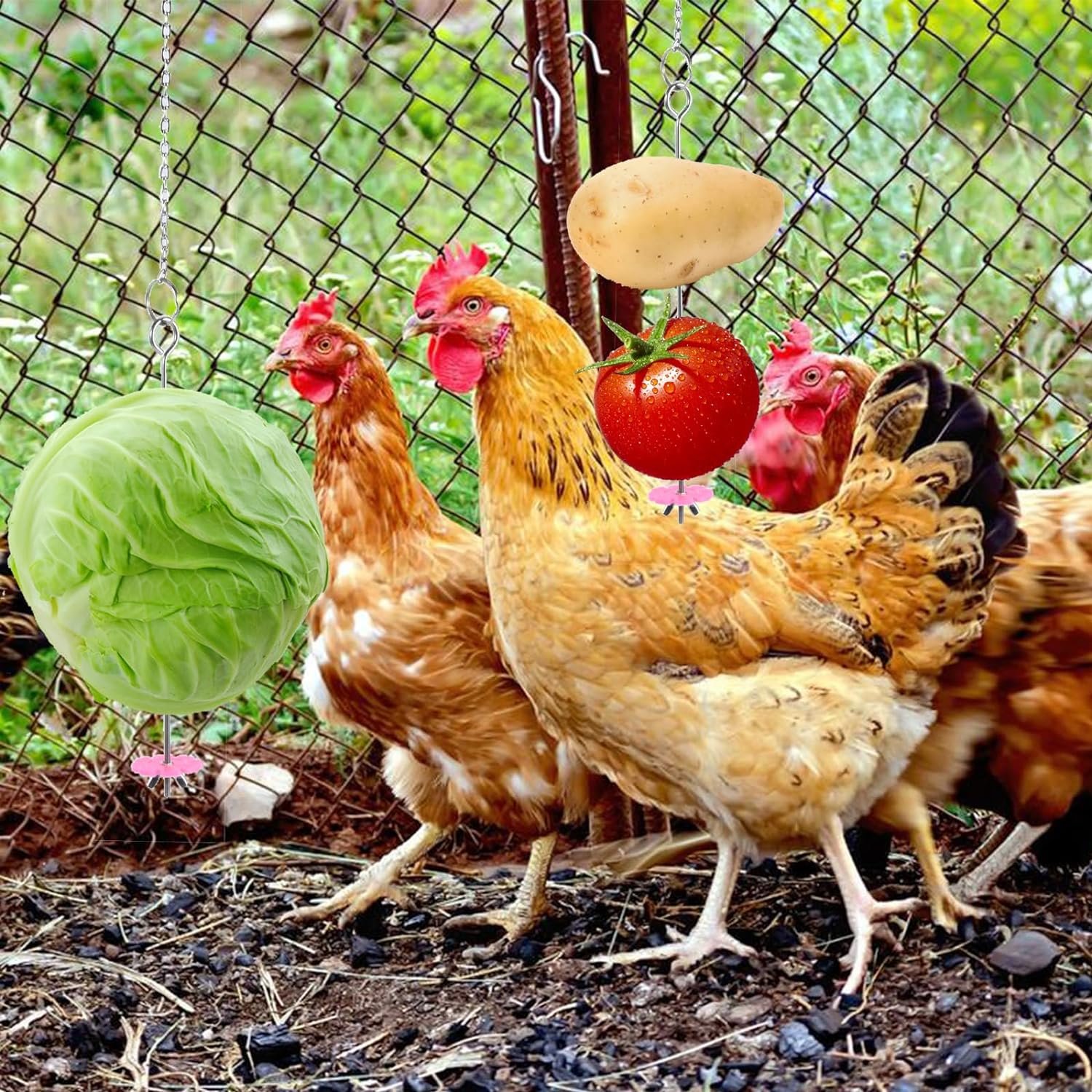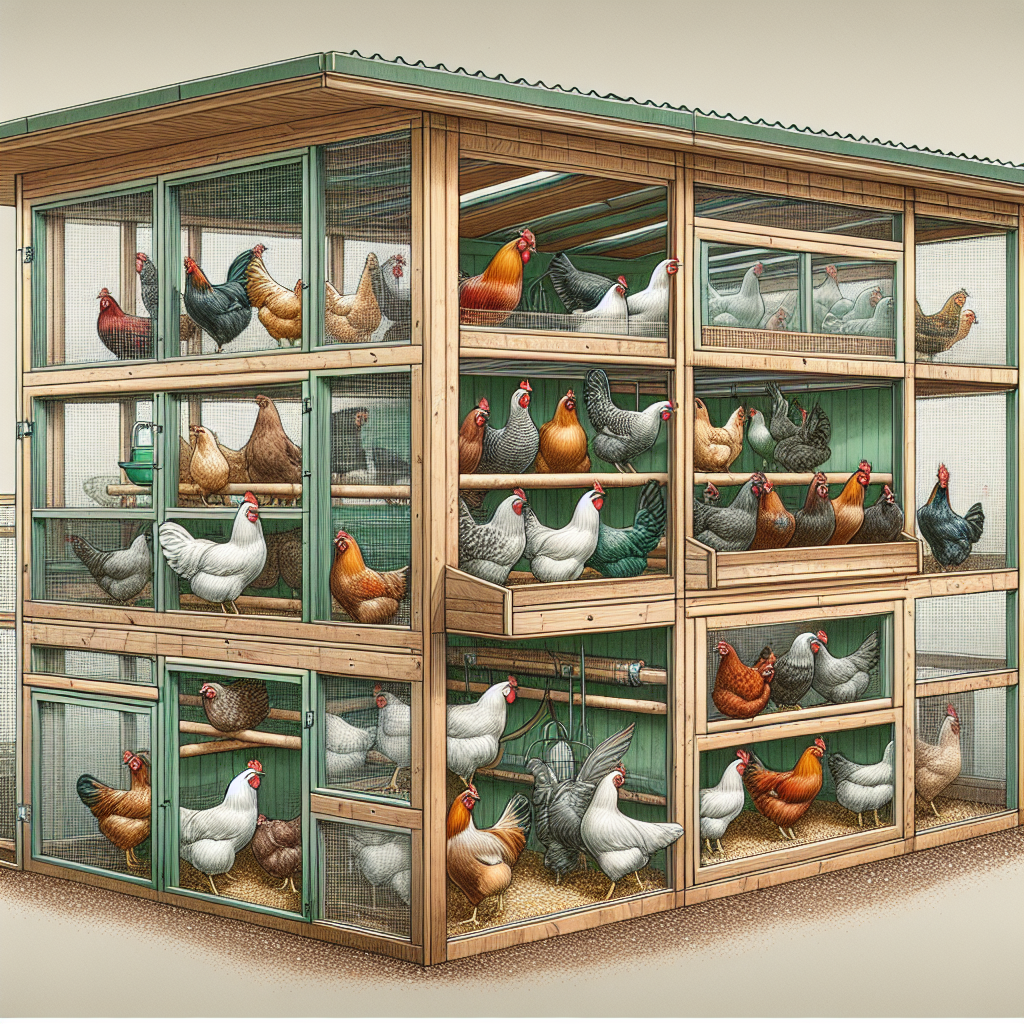Imagine a world where raising chickens is not only fun but also sustainable and beneficial. Well, that world exists, thanks to the ingenious idea of mobile or tractor coops. These innovative structures bring numerous advantages to chicken keepers, allowing them to provide their feathery friends with a safe environment while reaping the rewards of fresh eggs. With their mobility and versatility, these coops revolutionize the way we interact with our fowl companions, offering an array of benefits that will make any chicken keeper cluck with delight. So, let’s explore how mobile or tractor coops take chicken keeping to a whole new level!
I. Increased Access to Fresh Grazing Areas
A. Healthier Environment for Chickens
Mobile or tractor coops provide chicken keepers with the opportunity to give their chickens access to fresh grazing areas. This means that the chickens can roam freely and forage on fresh grass, insects, and other natural foods. This natural and varied diet leads to healthier chickens, as they are able to obtain a wider range of nutrients compared to chickens that are kept in confinement. The fresh grazing areas also contribute to the overall health of the chickens by giving them exposure to natural sunlight and fresh air.
B. Improved Nutrition
By allowing chickens to graze on fresh vegetation and forage for insects, mobile or tractor coops provide them with an improved and more diverse diet. The insects consumed by the chickens are rich in protein, which is an essential nutrient for their growth and development. Additionally, the chickens have access to a variety of plant-based foods, such as grasses and weeds, which can provide them with important vitamins and minerals. The improved nutrition resulting from access to fresh grazing areas can lead to healthier chickens with stronger immune systems.
C. Reduced Parasite Infestation
Chickens that are kept in traditional stationary coops are more susceptible to parasite infestations, such as mites and worms. However, with mobile or tractor coops, chicken keepers can regularly move their chickens to fresh grazing areas. This rotational grazing approach helps break the parasite cycle, as the chickens are not continuously exposed to the same contaminated environment. The fresh grazing areas provide the chickens with a cleaner and less parasite-infested environment, ultimately reducing the risk of infestations and improving the overall health of the flock.
D. Enhanced Natural Behavior
Mobile or tractor coops enable chickens to exhibit their natural behaviors more freely. In confinement, chickens are often limited in their movement and unable to express their natural instincts, such as scratching the ground, dust bathing, and stretching their wings. By providing chickens with access to fresh grazing areas, mobile or tractor coops allow them to engage in these behaviors, promoting their overall well-being and happiness. The ability to exhibit natural behaviors also helps to reduce stress and aggression among the flock, leading to a more harmonious and contented chicken community.
II. Flexibility in Pasture Management
A. Rotational Grazing
One of the key benefits of mobile or tractor coops is the ability to practice rotational grazing. Rotational grazing involves moving the coop to a fresh grazing area after a certain period of time. This allows the previous grazing area to rest and recover before the chickens return. Rotational grazing not only prevents overgrazing, but it also promotes the growth of healthy grasses and plants. By rotating the chickens to different areas, chicken keepers can ensure that the pasture remains productive and sustainable for the long term.
B. Preventing Overgrazing
Overgrazing can occur when chickens are kept in a single location for an extended period of time. This can lead to the depletion of vegetation, soil erosion, and a decline in overall pasture health. However, with mobile or tractor coops, chicken keepers can easily move their chickens to new areas once the current pasture is starting to show signs of overgrazing. By preventing overgrazing, chicken keepers can maintain healthier pastures that can continue to provide ample grazing opportunities for their chickens.
C. Efficient Manure Distribution
Mobile or tractor coops also offer the benefit of efficient manure distribution. As chickens move around in their coop, they naturally deposit manure onto the pasture. With a mobile or tractor coop, the manure is distributed evenly across the grazing areas as the coop is moved from one location to another. This helps to fertilize the pasture, promoting the growth of healthy vegetation. The efficient distribution of manure also minimizes the concentration of waste in one area, reducing the risk of nutrient runoff and pollution.
D. Reduced Soil Erosion
Soil erosion can be a major concern in traditional stationary poultry systems, where chickens are continuously kept in one area. The constant pecking and scratching of the chickens, coupled with the lack of vegetation cover, can lead to soil erosion and the degradation of the land. However, with mobile or tractor coops, chicken keepers can mitigate soil erosion by regularly relocating their chickens. By allowing the pasture to recover and regrow before the chickens return, the risk of soil erosion is greatly reduced, leading to healthier soil and improved environmental sustainability.
III. Protection from Predators and Diseases
A. Mobility as a Predator Deterrent
Mobile or tractor coops provide a level of protection for chickens against predators. The mobility of these coops makes it more difficult for predators, such as foxes or raccoons, to access the chickens. By regularly moving the coop to new areas, chicken keepers can reduce the likelihood of predators becoming familiar with the coop’s location and patterns. This deterrent effect helps to keep the chickens safe and minimizes the risk of predation.
B. Easier Monitoring and Control
With mobile or tractor coops, it becomes easier for chicken keepers to monitor their flock and maintain control over their chickens. As the coop can be moved closer to the living areas of the chicken keeper, keeping an eye on the flock becomes more convenient. Additionally, any signs of illness or distress among the chickens can be quickly detected, allowing for timely intervention and treatment. The ability to closely monitor the flock results in improved overall flock health.
C. Reduced Risk of Disease Transmission
By regularly relocating the coop to fresh grazing areas, mobile or tractor coops help to reduce the risk of disease transmission among the flock. Traditional stationary coops can become contaminated with pathogens and parasites over time, leading to an increased risk of infection. However, by moving the coop to new areas, any potential disease-causing agents are left behind, minimizing the risk of disease transmission. This proactive approach to disease prevention is important for maintaining the overall health and well-being of the flock.
IV. Easy Relocation and Setup
A. Quick Relocation to New Areas
One of the advantages of mobile or tractor coops is the ease and speed with which they can be relocated to new areas. This flexibility allows chicken keepers to take advantage of different grazing opportunities and adjust to changing environmental conditions. Whether it’s moving the coop to a different section of the property or taking the chickens to a completely new location, the quick relocation of the coop means that chicken keepers can adapt their management practices to maximize the well-being of their flock.
B. Simple Setup and Assembly
Mobile or tractor coops are designed to be easily set up and assembled, making them a convenient option for chicken keepers. These coops typically consist of lightweight materials and are designed for easy transportation. The assembly process often involves simple procedures, such as unfolding or connecting different sections of the coop. The simplicity of setup and assembly ensures that chicken keepers can efficiently relocate and prepare the coop without unnecessary complications or time-consuming processes.
C. Cost-Effective Infrastructure
In comparison to large-scale stationary poultry structures, mobile or tractor coops offer a more cost-effective infrastructure option for chicken keepers. The relatively smaller size and simpler construction of these coops can significantly reduce the upfront costs associated with poultry housing. Additionally, the mobility of the coops eliminates the need for expensive fixed infrastructure, such as fencing or permanent structures. This cost-effective infrastructure allows chicken keepers to invest their resources in other aspects of chicken husbandry, such as feed quality, healthcare, and flock expansion.
V. Enhanced Sustainability and Environmental Impact
A. Reduced Carbon Footprint
The use of mobile or tractor coops can contribute to a reduced carbon footprint in chicken keeping operations. The rotational grazing system employed by these coops promotes the maintenance of healthy pasture, which in turn acts as a natural carbon sink. The frequent relocation of the coop also reduces the need for mechanical tilling and plowing, further minimizing greenhouse gas emissions. By adopting mobile or tractor coops, chicken keepers can actively contribute to sustainable farming practices and reduce their impact on the environment.
B. Efficient Use of Resources
Mobile or tractor coops promote efficient use of resources in chicken keeping operations. As the chickens graze on fresh forage, their reliance on supplemental feed decreases. This can help reduce the demand for feed resources, such as grain or soy, which are often associated with negative environmental impacts, such as deforestation or habitat destruction. The efficient use of resources ensures that chicken keeping practices are more sustainable and contribute to the overall conservation of natural resources.
C. Integration with Regenerative Agriculture
Mobile or tractor coops are a valuable component of regenerative agriculture practices. Regenerative agriculture aims to restore and enhance the health of ecosystems, improve soil fertility, and sequester carbon. By utilizing mobile or tractor coops, chicken keepers can actively participate in regenerative practices by providing chickens with access to fresh grazing areas. The chickens contribute to soil health through their manure, while the rotational grazing system helps regenerate the pasture. The integration of mobile or tractor coops with regenerative agriculture approaches creates a symbiotic relationship that benefits both the environment and the chickens.
VI. Improved Chicken Behavior and Welfare
A. Reduced Stress and Aggression
Mobile or tractor coops contribute to the improved behavior and welfare of chickens. The ability to freely move around and access fresh grazing areas helps to reduce stress levels among the chickens. Stress can arise from overcrowding, lack of space, or a monotonous environment. By providing a more spacious and stimulating environment, mobile or tractor coops help minimize stress and promote more natural behaviors. The reduced stress levels result in calmer chickens, leading to fewer incidences of aggression and feather-pecking within the flock.
B. Increased Exercise and Mental Stimulation
Regular access to fresh grazing areas offers chickens the opportunity for increased exercise and mental stimulation. In a mobile or tractor coop, chickens have more space to move around and engage in physical activities, such as scratching, pecking, and running. This increased exercise promotes muscle development and overall fitness. Additionally, the diverse and natural environment of the grazing areas stimulates mental engagement for the chickens, keeping them mentally stimulated and preventing boredom.
C. Natural Sunlight and Fresh Air Exposure
Mobile or tractor coops provide chickens with exposure to natural sunlight and fresh air, which are vital for their health and well-being. Sunlight exposure enables chickens to synthesize vitamin D, which is essential for calcium absorption and overall bone health. Fresh air circulation helps maintain good respiratory health and reduces the risk of respiratory diseases. By allowing chickens to experience natural sunlight and fresh air, mobile or tractor coops contribute to the overall vitality and happiness of the flock.
VII. Scalability and Expansion Opportunities
A. Increased Flock Sizes
Mobile or tractor coops offer chicken keepers the opportunity to increase their flock sizes. The flexibility and adaptability of these coops make it easier to accommodate larger numbers of chickens. By expanding the flock size, chicken keepers can increase their egg or meat production, potentially leading to increased profitability. The scalability of mobile or tractor coops allows chicken keepers to grow their operations at their own pace and according to market demand.
B. Gradual Expansion
With mobile or tractor coops, chicken keepers have the option to gradually expand their operations. They can start with a smaller flock and scale up over time as they gain experience and confidence in managing larger numbers of chickens. This gradual expansion approach allows chicken keepers to control their investment and minimize the risks associated with rapid expansion. By starting small and gradually increasing the flock size, chicken keepers can ensure a smooth and sustainable growth trajectory.
C. Ability to Raise Different Poultry Species
Mobile or tractor coops provide the flexibility to raise different poultry species. While they are commonly associated with chicken keeping, these coops can also accommodate other poultry species, such as ducks, turkeys, or guinea fowl. The design and size of the coops can be adjusted to suit the specific needs of different poultry species. This versatility in raising different poultry species allows chicken keepers to diversify their product offerings and potentially tap into niche markets.
VIII. Community and Educational Engagement
A. Interactive Farm Tours
Mobile or tractor coops can be used as an educational tool to engage the community and provide farm tours. The mobility of these coops allows chicken keepers to easily showcase their operations and practices to visitors. Farm tours provide an opportunity for community members, school groups, or aspiring chicken keepers to learn about sustainable chicken keeping, regenerative agriculture, and the benefits of mobile or tractor coops. The interactive nature of these tours allows for valuable conversations and knowledge sharing.
B. Local Food System Involvement
Mobile or tractor coops facilitate chicken keepers’ involvement in the local food system. By producing eggs or meat using sustainable and environmentally-friendly practices, chicken keepers can contribute to the availability of locally produced, high-quality food. They can establish relationships with farmers markets, local co-ops, or restaurants that prioritize locally sourced products. This involvement in the local food system strengthens community connections and supports sustainable agriculture initiatives.
C. Educational Demonstrations and Workshops
Mobile or tractor coops offer a platform for educational demonstrations and workshops. Chicken keepers can share their knowledge and expertise with others by organizing on-site workshops or demonstrations. These educational events can cover topics such as flock management, pasture rotation, sustainable chicken keeping practices, and the benefits of mobile or tractor coops. By hosting such events, chicken keepers can empower others to adopt more sustainable and welfare-friendly methods of poultry production.
IX. Improved Biosecurity
A. Reduced Exposure to Wild Birds
Mobile or tractor coops can help reduce the risk of disease transmission from wild birds to chickens. Traditional stationary coops are more susceptible to wild bird visits, which can introduce potential diseases or parasites into the flock. However, by frequently relocating the coop, the exposure to wild birds is minimized. The mobility of mobile or tractor coops acts as a deterrent to wild birds, ensuring that the flock remains protected from potential sources of disease.
B. Controlled Visitor Access
Another biosecurity advantage of mobile or tractor coops is the ability to control visitor access. As these coops can be easily relocated, chicken keepers have the flexibility to restrict access to their flock, especially during critical periods, such as when new chickens are introduced or during disease outbreaks. By limiting contact with outside visitors or other poultry, chicken keepers can reduce the risk of disease introduction and prioritize the health and safety of their flock.
C. Limited Disease Introduction
Regularly moving the coop to fresh grazing areas helps minimize the risk of disease introduction. Traditional stationary coops can become contaminated with pathogens over time, making it difficult to completely eradicate diseases. However, by relocating the coop, any potential disease-causing agents are left behind, reducing the risk of re-infection. The proactive approach to disease prevention through limited disease introduction ensures the health and biosecurity of the flock.
X. Regulatory Compliance and Zoning Benefits
A. Adherence to Zoning Regulations
Mobile or tractor coops can help chicken keepers adhere to zoning regulations. In some areas, there may be restrictions on the size or type of permanent structures allowed for poultry operations. However, mobile or tractor coops are often classified differently or exempted from these restrictions due to their temporary nature. By utilizing these coops, chicken keepers can ensure compliance with zoning regulations without compromising their ability to keep chickens.
B. Compliance with Animal Welfare Standards
Mobile or tractor coops can contribute to compliance with animal welfare standards. The ability to provide chickens with access to fresh grazing areas aligns with the principles of good animal welfare, as it allows chickens to exhibit natural behaviors and have a better quality of life. By prioritizing the welfare of their flock through the use of mobile or tractor coops, chicken keepers can demonstrate their commitment to meeting or exceeding animal welfare standards set by regulatory bodies or industry certifications.
C. Collaboration with Local Authorities
Mobile or tractor coops offer opportunities for collaboration between chicken keepers and local authorities. These coops can be a viable option for backyard chicken keeping, especially in urban or suburban settings where space constraints and zoning regulations may pose challenges. By actively engaging with local authorities, chicken keepers can work together to draft appropriate regulations or guidelines that accommodate the use of mobile or tractor coops, while ensuring the welfare of the chickens and the interests of the community.
In conclusion, mobile or tractor coops offer numerous benefits to chicken keepers. From providing increased access to fresh grazing areas and improving nutrition to enhancing sustainability and improving chicken behavior and welfare, these coops are a valuable tool for chicken keeping operations. The flexibility in pasture management, protection from predators and diseases, easy relocation and setup, and the various scalability, community engagement, biosecurity, and regulatory compliance advantages make mobile or tractor coops a practical and efficient option for chicken keepers looking to provide their chickens with a healthy and sustainable environment.




